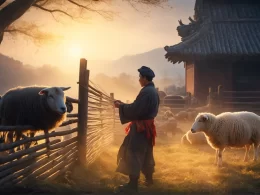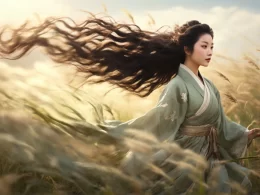Idiom Explanation:
The carriages are incessant, like flowing water, and the horses are connected at the head and tail, like swimming dragons. Describe the many cars and horses along the way, in groups, the scene of prosperity and bustle.
Pronunciation:
车水马龙
chē shuǐ mǎ lóng
Origin:
汉代·班固等《东观汉记 ·明德马皇后》:“吾前过濯龙门,见外家问起居,车如流水马如龙,亦不谴怒,但绝其岁用,冀以嘿止欢耳。”
Story:
Ma, the youngest daughter of Ma Yuan, a famous general of the Eastern Han Dynasty, took care of the family affairs at a very young age due to the early death of her parents, and kept the household in order, which was praised by her friends and relatives as a capable person.
At the age of thirteen, Ma was chosen to enter the palace. She first served the empress of Emperor Guangwu of Han Dynasty and was very much loved. After Emperor Guangwu's death, Prince Liu Zhuang assumed the throne as Emperor Ming of Han, and Ma was made a noblewoman. Since she never had any children, she adopted one of Jia's sons and named him Liu Jin. In 60 A.D., she was made empress of Emperor Ming because the Empress Dowager was very fond of her.
When Ma became empress, she still lived a very frugal life. She often wore coarse cloth clothes and her skirts were not hemmed. When some concubines met her, they thought she was wearing clothes made of particularly good materials. When they came closer, they realized that it was a very ordinary material, and from then on they respected her more. Empress Ma knew books and manners, and often read the Spring and Autumn Period and the Book of Chu seriously. On one occasion, Emperor Ming deliberately showed her a minister's memorial and asked her how it should be handled, and she gave her pertinent advice on the spot after reading it. However, she did not interfere with the imperial government because of this, and never took the initiative to talk about the imperial court after that.
After the death of Emperor Ming, Liu Jin reigned, and this was Emperor Zhang of Han. Empress Ma was honored as the Empress Dowager. Soon after, Emperor Zhang intended to knight the Empress Dowager's brethren according to the advice of some ministers. The Empress Dowager Ma, following the late Emperor Guangwu's rule that the family of a consort should not be knighted, explicitly opposed this, so the matter was not done.
The next summer, there was a great drought. Some ministers again submitted that this year's drought was due to last year's non-feudalization of foreign relatives. They again asked to divide the title of Ma's uncle. Empress Dowager Ma still did not agree and issued an edict for this purpose, which said: "Anyone who proposes to ennoble a relative is trying to pander to me and get benefits from it. What does the great drought have to do with knighthoods? Remember the lesson of the previous dynasties, favoring foreign relatives will bring about a great disaster of capitulation. The late emperor did not allow foreign relatives to hold important positions because he was prepared for this. In the future, how can we let the Ma follow the old path again?"
The imperial edict also said, "The Ma family's uncles are all very rich and powerful. As the Empress Dowager, I still eat without seeking sweetness, dress simply, the left and right palace concubines also try to be frugal. I do so in order to set an example for the next, so that foreign relatives see the good self-reflection. However, they do not reflect on themselves, but rather ridicule me too frugal. A few days ago, I passed by the gate of my mother's house, Mauro Yuan, and saw that the cars were going to my uncle's house from outside to pay respects and pay respects like flowing water, and the horses were going to and fro like a dragon, which was very impressive. The maids in their house were neatly dressed, with green clothes and very white collars and sleeves; look at our car, it was far worse than them. I tried my best to control myself at that time and did not blame them. How could I agree to give them an increase in rank when they knew only their own pleasure and did not worry at all about the country?"
Similar Idioms:
- 门庭若市
- 络绎不绝












